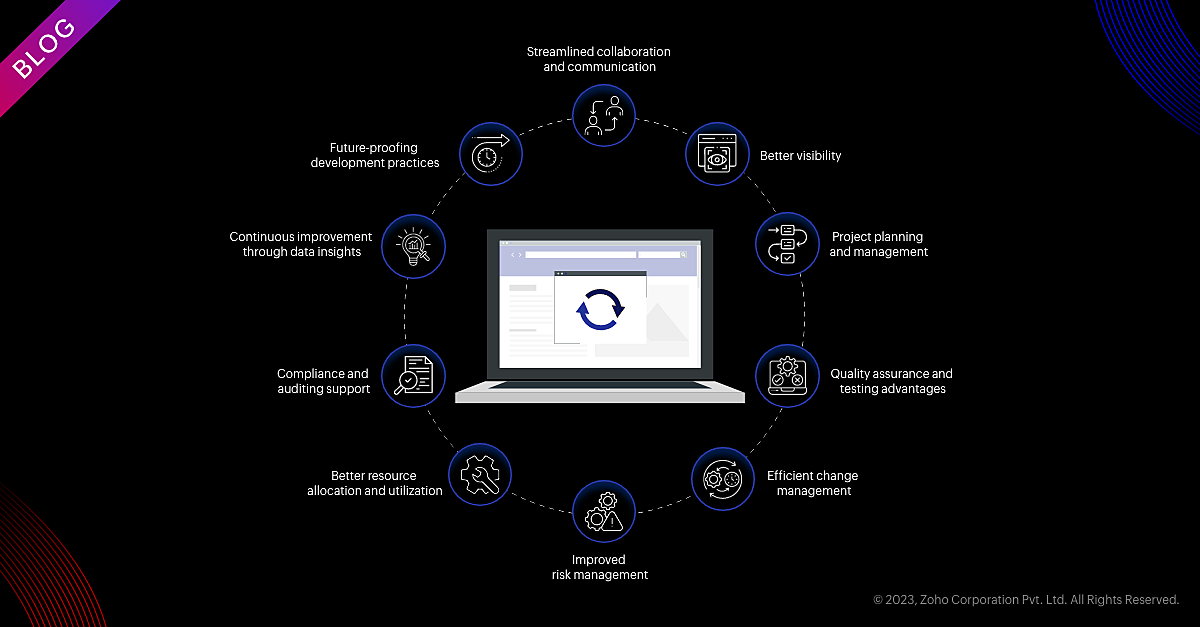- HOME
- Know Your Tech
- Top 10 benefits of application lifecycle management (ALM) in software development
Top 10 benefits of application lifecycle management (ALM) in software development
- Last Updated : September 12, 2023
- 2.0K Views
- 4 Min Read
Software development is now a chief cornerstone of business growth and innovation. However, with the increasing complexity of software projects, managing the entire development lifecycle has become challenging. This is where application lifecycle management (ALM) comes into play. ALM is a comprehensive approach that helps development teams efficiently plan, develop, test, deploy, and maintain software applications—from sunrise to sunset.
Based on a report by Business Research Insights, the global market size of application lifecycle management (ALM) software was expected to be $456.1 million USD in 2021 and is projected to touch $839.6 million USD by 2028, with a CAGR of 8.7% during the forecast period. It's safe to say that ALM is in demand now more than ever.
An introduction to application lifecycle management (ALM) - What it is and why it's important?
Let's take a look at the top 10 benefits of adopting an ALM approach in software development, and how it can contribute to the success of your projects

1. Streamlined collaboration and communication
One of the primary advantages of ALM is its ability to foster seamless collaboration and communication among cross-functional teams. ALM tools provide a centralized platform where developers, testers, project managers, and stakeholders can collaborate in real time. This reduces communication gaps, minimizes misunderstandings, and ensures that all team members are on the same page throughout the development lifecycle. Whether it's sharing requirements, tracking progress, or discussing issues, ALM encourages transparency and teamwork, leading to higher-quality outcomes.
2. Better visibility
ALM offers end-to-end visibility into the software development process. With traceability features, you can easily track the evolution of requirements, changes, and defects across various stages of development. This is particularly beneficial in maintaining compliance with industry standards and regulations. Moreover, the ability to trace back to specific requirements or code changes enables quicker identification and issue resolution, reducing the risk of costly errors in the final product.
3. Project planning and management
The key to successful software development is proper planning and management. ALM tools enable teams to create and manage project plans, allocate resources, set priorities, and estimate timelines more accurately. By breaking down complex projects into manageable tasks and assigning responsibilities, ALM ensures that development efforts are aligned with business goals. Project managers can monitor progress, identify bottlenecks, and make informed decisions to keep projects on track.
4. Quality assurance and testing advantages
Quality assurance and testing are integral parts of software development that contribute to the overall reliability and performance of the application. ALM facilitates a structured approach to testing by providing tools to create test cases, manage test data, and automate testing processes. This results in more thorough and consistent testing, reducing the chances of defects reaching production.
Additionally, ALM tools integrate with continuous integration and continuous delivery (CI/CD) pipelines, ensuring that code changes are thoroughly tested before deployment.
5. Efficient change management
In the ever-evolving world of software development, change is inevitable. ALM excels in managing change by offering features such as version control, configuration management, and change tracking. Developers can work on different versions of the code simultaneously, making it easier to experiment with new features or fixes without disrupting the main codebase. If a change leads to unforeseen issues, the ability to roll back to a previous version ensures a smoother recovery process.
6. Improved risk management
Risk is inherent in software development, ranging from technical challenges to shifting business priorities. ALM aids in risk management by providing a platform to identify, assess, and mitigate risks throughout the development cycle. By having a clear understanding of potential risks and their impact, teams can implement proactive measures to minimize disruptions and optimize decision-making.
7. Better resource allocation and utilization
Resource management is critical to ensure that projects are completed within budget and on time. ALM tools enable teams to allocate resources efficiently, whether it's assigning developers to specific tasks or optimizing hardware and software resources. This prevents resource shortages or overutilization, leading to improved productivity and cost savings.
8. Compliance and auditing support
In industries subject to strict regulatory requirements—such as healthcare or finance—compliance is non-negotiable. ALM provides the necessary tools to document processes, track changes, and maintain an audit trail. This level of documentation simplifies compliance audits and ensures that the development process adheres to industry standards and guidelines.
9. Continuous improvement through data insights
Data-driven insights are invaluable for enhancing software development processes. ALM tools generate a wealth of data, including metrics related to project progress, defect rates, and development cycle times. Analyzing these metrics enables teams to identify areas for improvement and implement iterative changes that lead to enhanced efficiency and higher-quality outcomes.
10. Future-proofing development practices
Technology trends and methodologies are constantly evolving. ALM supports the adoption of modern practices like DevOps and Agile, enabling teams to incorporate new approaches into their development process seamlessly. This adaptability ensures that your software development practices remain relevant and competitive in a constantly challenging business landscape.
Read more on application lifecycle management (ALM)
Effortless ALM with Zoho Creator
In an era where software development plays a pivotal role in driving innovation and growth, adopting an ALM approach is no longer a luxury, but a necessity. Businesses can greatly benefit from adopting ALM practices by empowering development teams to transform chaotic processes into well-orchestrated ones.
Zoho Creator is a powerful low-code platform that enables developers of all levels to build and manage the entire lifecycle of software applications. The all-in-one software builder is user-friendly and cost-effective, and comes with a plethora of features that can elevate your business to newer heights.
 Stephen
StephenStephen is a product marketer at Zoho Creator. An avid writer, he plies his trade evangelizing low-code during the day and pens songs at night. Sneakerhead and sushi enthusiast too.



